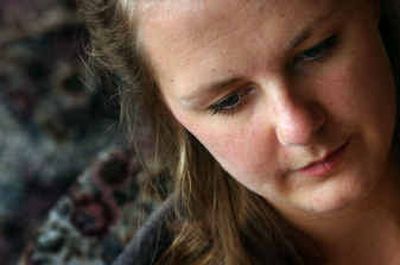Opportunity to help

A recent trip to Mexico was a life-changing experience for 11 area residents. As participants in Project Mexico, the group of nine young adults and three volunteer leaders, primarily from Christ the Savior Antiochian Orthodox Church in Spokane and St. John’s Orthodox Church in Post Falls, had agreed to help build homes for the less fortunate. It took two years to raise enough money to pay for trip expenses.
“The group worked very hard to raise the money by holding car washes, bake sales and dinner-dances,” says Janell McDaniel of Post Falls, one of the adult leaders. Parish congregations also contributed to the fund-raising campaign.
Project Mexico developed from founder Greg Yova’s vision to “provide young people an opportunity to look beyond themselves and reach out personally to those in need.”
The idea was simple enough but is something most American families take for granted — help struggling families make a better life for themselves by providing them with a secure, safe and permanent home.
Yova recruited young adults to help build homes in neighboring Mexico, where the need for basic human services is great. Part of the money raised was used to pay a fee to buy building materials and food for the workers.
The group flew to San Diego, rented a van and drove across the border to Tijuana. There they were joined by 60 other people who came from across the United States and Canada.
Their goal was to build two solid stucco homes with concrete floors — no electricity and no plumbing — in just four days.
In Mexico, low-cost government land is available only if the family lives on it. Families spend all their money to buy land, which leaves nothing for actual home construction.
As a result, Mexico has an abundance of hastily constructed shanties made of cardboard, tin and salvaged materials. These structures are inadequate, as evidenced by the number of children and elderly who die each winter from cold and exposure.
Although no construction experience is necessary to participate in Project Mexico, a trained supervisor manages house construction.
Project Mexico provides all tools, but no power tools are allowed on the work site for safety reasons.
“In one week we were able to give a family their very own home,” says Ashley Swanson, 18, of Everson, Wash. “Experiencing true poverty is something no picture in a magazine or excerpt on TV can give you.”
Although there was a lot of hard work, the group also had time to meet and talk to the local people. They heard many stories about the Mexican children who loved to play and sing at the work site each day.
They also got to meet the families that would live in the home they were constructing.
“Fernando, his wife Veronica, and their four boys were at the site everyday,” McDaniel says. “Although he worked nights as a maintenance man, he would show up every morning to help.”
On the last day of building, Fernando and his family fed all the volunteers a lunch of barbecue beef, beans, homemade tortillas and soda.
“The cost of this one meal was the equivalent of Fernando’s salary for one week,” says McDaniel.
According to McDaniel, one Mexican woman broke down in tears when her house was completed. “She said it was the first time she felt safe because she could lock a door.”
Matt Dotson, 16, of Spokane, says Project Mexico was a wonderful experience.
“I went on the trip to Mexico to build a house for a needy family. I think that if every one were to do something like this in their lifetime, their lives would certainly change tremendously.”
Even though the volunteers had no electricity and slept on planks of wood at night, Simone Ott, 17, of Spokane says, “life had meaning — you knew why you were getting up in the morning.”
Project Mexico utilizes all-volunteer labor and has built more than 100 homes since its inception in 1988. More than 6,500 volunteers have traveled from 43 states and 11 foreign countries to lend a hand.
Project Mexico holds nonprofit status in the U.S. and Mexico. Funding comes from individual donors, parishes, charitable organizations, foundations and corporate donors. Recipient families are chosen by local clergy and community leaders who are familiar with them and can verify their circumstances.
Project Mexico also supports St. Innocent Orphanage, in Tijuana, that provides educational opportunities, vocational and Christian training for up to 35 boys. Their goal is to reduce crime and help these boys to “grow into godly men who are upstanding citizens and productive members of society,” according to St. Innocent’s literature.
Project Mexico’s master plan includes more vocational and business training, as well as profit-making ventures to help support the orphanage.
Another Project Mexico leader, Tony Dotson, felt the trip was just as meaningful for the adult leaders and very humbling.
“To see so many with so little, yet so happy is very humbling to all of us that complain about the little things. I know personally what I took from this trip will affect me the rest of my life,” Dotson says.
All the volunteers agreed that Project Mexico offered a unique environment for spiritual growth and a time to experience God’s blessings.
Each person had a chance to give to others in a special way — serving those who can only repay with sincere gratitude.
McDaniel says it would be beneficial if people of all ages could experience a similar trip.
“I cannot express in words what my heart saw,” McDaniel says. “Experience is the only teacher.”